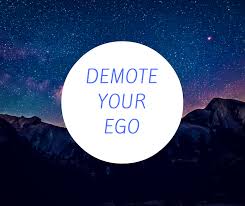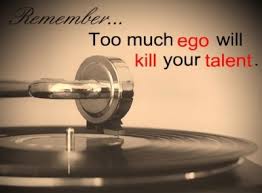- The Ultimate Guide to Journaling: How To Teach Expressive Writing - June 13, 2022
- Journaling: How To Use Writing To Support Your Mental Health - May 27, 2022
- How To Honor National Mental Illness Awareness Month With Action - October 3, 2021
At the Intersection of Ego and Creativity
 Trust me. This article addresses the role of ego in creativity. But before I get into the heart of that discussion, let’s pretend this is Psychology 101. Had that class already? Alright then, consider this a refresher course.
Trust me. This article addresses the role of ego in creativity. But before I get into the heart of that discussion, let’s pretend this is Psychology 101. Had that class already? Alright then, consider this a refresher course.
Dr. Sigmund Freud came to conclusions that forever altered our understanding of the mind, conscious and unconscious. Love him or hate him, that’s a remarkable achievement for one person.
Freud introduced terms to define the psychic apparatus that have stood the test of time: id, ego, and superego. Now you know from the title which one of the three I want to talk about but bear with me while I review.
The Id
The id is the part of the personality structure that holds a human’s basic, instinctual drives, and is the only part of personality that is present from birth. OK, done.
The Superego
The superego aims for perfection. It draws on our internalized cultural rules (taught by our parents, other family members, or adult role models). The superego works in contradiction to the id. How? It criticizes and prohibits drives and fantasies initiated by the id. If you do something (or even think about doing something) and you feel guilty or anxious as a result, you can thank the superego.
The Ego
The ego is the term Freud used to mean a sense of self, but later revised it to mean a set of psychic functions such as reality testing, judgment, tolerance, control, planning, defense, and memory. The ego is busy; it helps us organize our thoughts and make sense of them and the world around us. And this is great when the ego functions in a healthy, balanced manner on our behalf.
The Many Roles of the Ego
In simple terms, the ego spends a lot of time running interference between the id and the superego. To do this, the ego uses defense mechanisms to strike a balance between the hedonism of the id’s impulses and the maternal finger-wagging of the super-ego. But like any other aspect of our psyche, these defense mechanisms can malfunction. And that’s what this is about.
What Ego Isn’t
The term ego might be one of the most overused and misunderstood words in our everyday vocabulary. People throw the word around to mean different personal attributes. These are what ego is not:
- Self-confidence
- Self-esteem
- Arrogance
- Narcissism
The first two are generally considered positive traits and are most often assigned to women, while the last two are generally considered negative traits and are most often used to describe men (sorry, but it’s true).
An unhealthy ego can result in two seemingly contradictory but equally unfortunate behaviors. The first is commonly known as an over-inflated ego. This is when ego strays into narcissism or arrogance. The other is often identified by saying that someone’s ego is deflated. This is when unhealthy ego causes us to often feel belittled, attacked, or one-upped.
Creativity and the Ego

Creativity flourishes in an environment of realistic objectives and open-minded reflection. Remember that one of the roles of a healthy ego is regular reality checks.
Creativity is hampered when the ego becomes overly fond of pats on the back. Who doesn’t enjoy praise or affirmation? But these warm, fuzzy feelings can become addictive and throw our ego out of balance. When praise becomes what we seek rather than assurance we have produced our best work, the ego has drawn us into an unhealthy realm. The same is true if the ego is underperforming and criticism only leaves us feeling depressed, hopeless, or useless, and unable to continue.
How can we help ourselves maintain a balanced ego? Do not let your work define who you are. You are not your work. If your work receives praise or awards, keep your ego in check by remembering and recognizing the contributions of others (there are always others who helped you). When the work receives criticism, stay focused on improving it and remember that it is the work that requires revision, not you. Strive for confidence — faith in your own abilities and a belief in yourselves.
[Like what you’ve read? Follow the blog so you don’t miss any content.]
READ NEXT
Read more about writing, creativity, and critique at Trish’s Website: Strike the Write Tone
Other posts by Trish:
- 12 Creative Ways to Support Mental Health
- Stigma: A Thorn in the Side of Mental Health Care
- With Mental Illness You Won’t Get a Casserole
Activism for Creative People: How to Use Artistic Activism to Change the World




Pingback: At the Intersection of Ego and Creativity – Daily Creatives